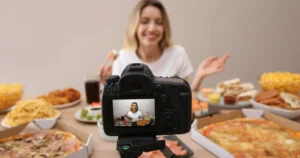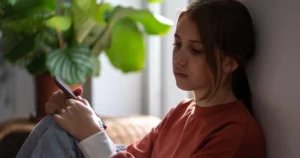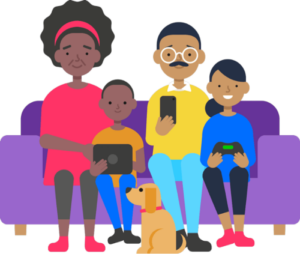Parasocial relationships are the one-way connections people form with online public figures.
Learn about the impact these relationships can have on your child.
Summary
- Parasocial relationships are one-way relationships people form with public figures.
- People form them due to the easy access they have to figures online.
- Parasocial relationships can reduce feelings of loneliness for some people.
- These relationships come with risks, including manipulation and social impacts.
- Nurturing critical thinking skills can help protect children and young people.
- You can explore more resources to support children’s wellbeing online.
What are parasocial relationships?
Parasocial relationships are one-sided connections that people form with celebrities, online influencers and fictional characters. These relationships involve one person feeling an emotional connection to another person they do not know in real life.
These relationships are common, and became even more prevalent during Covid-19. Many people relied on parasocial relationships to provide a sense of companionship and socialising during the pandemic. However, they can sometimes have a harmful impact.
Why do people form parasocial relationships?
It’s natural to form connections with people we frequently encounter. This becomes more likely in the age of the internet where people post about their lives and interact with fans online. Constant access to influencers might lead people to feel like they know them personally.
Additionally, some internet personalities will purposely attempt to cultivate parasocial relationships with their fans. They will greet them as ‘friends’ at the beginning of videos, or share personal details about their life, to cultivate a feeling of closeness. By doing this, fans are more likely to stay engaged and consume their content and products in future.
Benefits of parasocial relationships
Parasocial relationships are not always harmful. They can be as tame as feeling happy when an actor you like lands a notable role or your favourite footballer wins an award. Having this emotional connection can bring benefits.
During the Covid-19 pandemic, these relationships helped people feel connected and less lonely. This benefit still helps young people who have a tougher time interacting and forming connections with others offline. Parasocial relationships offer a feeling of human connection that they might otherwise not have.
They can provide a chance for young people to find community as well. Fans of certain celebrities often discuss them with others, and this can lead to the formation of real friendships.
Children who are LGBTQ+ can particularly benefit from following celebrities or influencers who share their identity. It can give them a feeling of belonging because others have the same concerns or struggles that they do.
Parasocial relationships offer the opportunity for learning and self-improvement. Celebrities and fictional characters can provide inspiration. For example, someone who feels an emotional connection to Cristiano Ronaldo might engage in more exercise through football.
Risks of parasocial relationships
Social impact
Most parasocial relationships are harmless. However, someone involved in one may forget they have never met the other person. They might begin to see it as a real relationship. This is a particular risk for children, who are often more suggestible.
People who invest too much time and attention into a parasocial relationship risk damaging their real relationships. If they feel like they already have a relationship with a public figure, they might spend less time nurturing their actual relationships.
This could lead to them talking less with friends and rejecting invites. They might also stop trying to meet new people. This could ultimately isolate them, and harm their social skills.
Emotional risk
Putting so much emotional investment into a person they don’t know risks potential emotional distress. A celebrity or influencer might act unexpectedly, stop creating content or pass away. As such, these drastic changes can can negatively affect a young person’s mental health.
Unhealthy ideas
If someone forms a parasocial relationship with an influencer, they might begin to accept the influencer’s views. This is a risk if the influencer starts sharing offensive or unhealthy ideas. The person’s feelings for the influencer can lead them to agree with these views.
An example of this is manosphere influencers such as Andrew Tate. They often entice viewers with videos of their personal lives, driving expensive cars and living in luxurious places. These influencers can then introduce misogynistic views with little push back. Because of this, followers are more likely to agree with these harmful opinions.
Loss of self-esteem
Many celebrities and influencers project an image of a perfect life on their social media. They only share images of parties or holidays, making people who view the profile believe that they are having fun non-stop. They might also only share pictures where they are looking perfect, or edit their images to remove physical flaws.
If someone is in a parasocial relationship with these influencers, it can cause them to lose self-esteem. They wonder why their life is so uninteresting, or why they are so unattractive, compared to a person that they share a ‘relationship’ with. They could develop a negative body image, which could in turn lead to disordered eating.
Manipulation
If an influencer knows that their audience have developed parasocial relationships with them, they might take advantage of it. They might begin selling merchandise with the angle that any ‘real’ fans will purchase it. This could pressure their fans into spending more than they can afford.
This is a particular risk for children — especially neurodivergent children — who might struggle to recognise when someone manipulates them.
Increased screen time
Being in a parasocial relationship can lead someone to spend more time on their device. Children might feel like they need to ‘foster’ the relationship by watching content. So, not watching their content might lead to feelings of FOMO and other negative impacts on their wellbeing.
How to keep kids safe
Parasocial relationships are not always harmful. However, if you think your child is overly obsessed with a celebrity or influencer, here are some tips and advice to keep them safe.
- Have regular conversations with your child about their digital life and any public figures they follow. Discuss the difference between being a fan and developing a relationship. Additionally, encourage them to take breaks from content they feel too invested in.
- Nurture your child’s critical thinking. This will make manipulation less likely and make them aware that they do not really know people they find online. You can do this through conversation and using stories in the news. Ask them about potential harm and what some one could do to stay safe.
- Balancing screen time can prevent your child from spending too much time viewing content from one personality. This can limit the development of strong parasocial relationships. Furthermore, by encouraging time offline, your child can spend more time developing real relationships.







